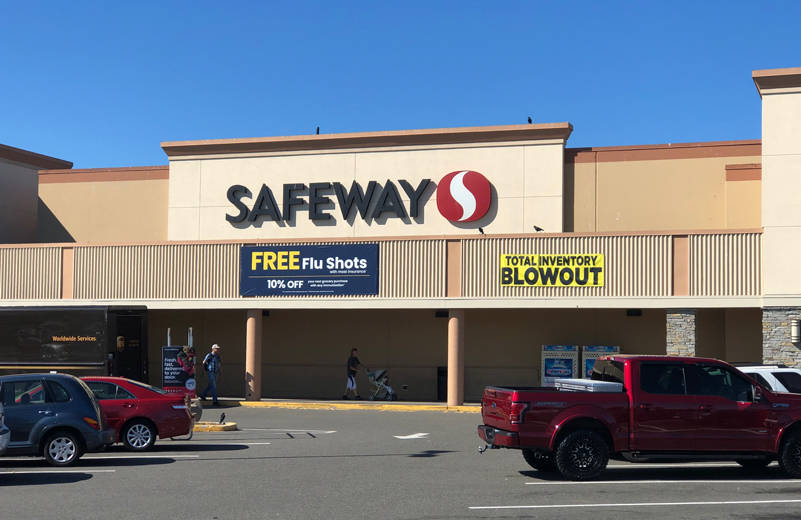By Morf Morford
Tacoma Daily Index
It is always a shock to see a prominent store close its doors.
These stores, for many of us, have been some of the foundational sites of our growing up. Those store names, like Sears, Penney’s and Safeway seem like anchors in our neighborhoods, our malls and our memories.
We expect them to be there forever.
And then they aren’t.
As I am sure you have heard, the Safeway store at Highland Hill on 6th Avenue in Tacoma is closing.
Including that store, Safeway had nine stores across Tacoma. Seattle has eighteen. Spokane has eight.
If you know Tacoma, you know that three of the city’s Safeway stores are quite close together – one on North Pearl, one on Proctor and the one closing soon on Highland Hill.
In a sense, most of us knew the closure of one of these stores would be inevitable – and we knew it would certainly NOT be the recently refurbished store on Pearl (between North 26th & 30th) or the showcase store in the always-bustling Proctor neighborhood.
The Highland Hill Safeway is closing soon, but the ultimate question is what will take its place.
Nothing is certain, but if we know anything about 6th Avenue and that entire area of Tacoma, we know that it won’t stay vacant long.
I don’t know how common this is for large grocery store chains, or even if they still follow it, but Safeway has had a longstanding policy of leasing, not owning their buildings.
Their stores are built new, to their specifications, and then leased, semi-indefinitely. It could be decades.
It is one of those policies that most of us might question, but for a retailer of that size, it makes solid sense.
They can occupy the store as long as it is profitable, and when it isn’t, they can close the doors, cut their losses and move on.
It makes a lot of sense.
A building of that size and design can be difficult to get rid of and if your business is groceries, getting tangled up in commercial real estate sales is probably not good for your business plan or bottom line. Disposing of commercial property is almost always best left to the professionals.
As I mentioned, Safeway likes its stores new. Other chains are not so picky.
Many former Safeway stores (or other mainline grocery stores) are now something entirely different.
The Big Lots on Pearl, not far from 6th Avenue, was an Albertson’s in its previous incarnation.
Stadium Thriftway and Metropolitan Market were both Lucky stores. And at least one of them (but I believe both) were Piggly Wiggly stores before that.
In other words, stores close, but most of them don’t stay closed for long. They might be another grocery store, or a warehouse store or some other creative or divided up use of that space.
One possible candidate for that space is WinCo.
WinCo is a word-combination of Winning Company; however, the company also says the name refers to the five states where the company originally operated stores (Washington, Idaho, Nevada, California, and Oregon).
WinCo is based in Boise, Idaho with retail stores in Arizona, California, Idaho, Montana, Nevada, Oklahoma, Oregon, Texas, Utah, and Washington.
WinCo was founded (originally named Waremart) in 1967. In 1985, Waremart employees purchased a majority stake, making the company employee-owned, and changed the name.
WinCo currently has a store on South 72nd in Tacoma.
WinCo could be defined as a discount model of a grocery store. They do not accept credit cards (they take checks, gift cards or cash) and they expect customers to, at minimum, help bag their own groceries.
And they have no problem reclaiming another company’s store (as they did on 72nd). All of these policies allow them to keep their expenses, and prices, low.
I’ve contacted WinCo and they did not prefer to comment on plans to expand their presence in Tacoma – but several Tacoma WinCo fans have put together a petition requesting an additional store on 6th Avenue.
It doesn’t always work smoothly of course.
Some large retail spaces, for complicated legal or financial reasons, like the K-Mart on 6th Avenue or Rite-Aid on MLK, stay closed seemingly permanently.
Big empty buildings – and their accompanying vast parking lots are a drain on the neighborhood.
It is in everyone’s interest to have buildings occupied and fully used.
After 2020, the retail landscape will be very different.
We as customers look at basic items, from toilet paper to baking yeast, and even the experience of physical shopping very differently than we did just a few months ago.
In the economy before 2020, there was a market demand for nine Safeways in Tacoma. By the end of 2020 there will be eight.
Will there be even fewer a year from now?
Would it be a good idea for a store with the business model of WinCo to take over an abandoned Safeway building?
Tacoma, like other cities, has what are called “food deserts;” these are areas where, unlike 6th Avenue and Tacoma’s North End, there is a paucity of food and grocery options.
There are vast stretches, mostly on Tacoma’s Eastside, where there are few if any immediately accessible (especially walkable) grocery stores.
The population in that area is high and you’d think that customer base would be large enough to sustain at least one, probably two full-sized grocery stores.
As I mentioned, the grocery/retail landscape in the near future will look very different.
Our familiar names and models of grocery stores may or may not look as they have for many years, but opportunity – and the need for basic groceries – will always be in front of us.





